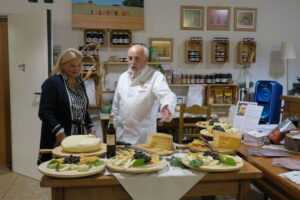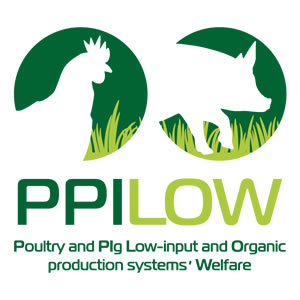An inusual dinner in Venice with Slow Food producers
– by Raffaella Ponzio (Slow Food)
At the 3rd annual meeting of the PPILOW project held in Venice (Italy) on October 12th, Slow Food organized a visit to a local farm that is part of the Slow Food Presidia network, Slow Food’s main project to protect agri-food biodiversity. Papaveri & Papere is a small-scale organic farm in Santa Maria di Sala, a few kilometers from Venice, that practices free-range farming of an ancient Veneto poultry breed: the Paduan Hen. Twenty years ago, Slow Food started the recovery project of this avian breed together with an agricultural high school in Padua, the “Duca degli Abruzzi” Institute. Paduan Hen is a breed once very present on farms in the Veneto region but now reduced to about 1,500 animals totally raised on four small-scale farms. Thanks to the promotion and communication activity of Slow Food Foundation for Biodiversity and the association that brings the breeders together, over time a quality local market for the meat of this breed has been found. Today the Paduan has returned to the plates of many restaurants in the Padua and Venice area, at remunerative prices for the breeders. Indeed, Slow Food’s bet to save plant varieties, traditional animal breeds, as well as cheeses, breads, and cured meats at risk of disappearing, focusing on their gastronomic, environmental, and cultural value, explaining to chefs, consumers, and retailers the need to commit to buying and consuming these agricultural products at a fair and remunerative price for producers. Even native breeds, such as plant biodiversity and even traditional processed products, disappear from the market the moment they can no longer provide adequate income for producers in a global food environment that is becoming profoundly standardized and industrialized. The Slow Food Presidia project succeeded, and today there are more than 600 Presidia (by this name Slow Food means the group of producers who adhere to a production specification based on sustainability and animal welfare) in more than 80 countries around the world. In Italy -where there is the largest number of Presidia- there are 360 projects involving more than 2,300 small-scale farms that have found a reason to continue living and producing even in certain difficult production contexts.

 Nicola Marchiori, the owner of Papaveri & Papere Farm, took the 36 meeting participants on a tour of his poultry houses, all strictly outdoors, where chickens from Paduan breed and others live from 4 to 5 months in total animal welfare, developing a very delicate meat that is rich in flavor thanks to a natural diet and its genetics. The farm is organic and also raises free-range pigs and other farm animals and offers agritourism hospitality and meals based on vegetables grown in Nicola’s garden -a necessary diversification since this breed consists of a few individuals that could not be raised by conventional methods, and as is often encountered in such cases, the farm’s income comes from a mix of sources. After visiting the animals, the following dinner was prepared with products from the Veneto Region Presidia and other agricultural products grown not only on the farm itself but also in the gardens of Sant’Erasmo, one of the islands in the Venetian lagoon that still provides the city with quality agricultural products grown by dozens of small family farms. After an aperitif of cured meats made from a
Nicola Marchiori, the owner of Papaveri & Papere Farm, took the 36 meeting participants on a tour of his poultry houses, all strictly outdoors, where chickens from Paduan breed and others live from 4 to 5 months in total animal welfare, developing a very delicate meat that is rich in flavor thanks to a natural diet and its genetics. The farm is organic and also raises free-range pigs and other farm animals and offers agritourism hospitality and meals based on vegetables grown in Nicola’s garden -a necessary diversification since this breed consists of a few individuals that could not be raised by conventional methods, and as is often encountered in such cases, the farm’s income comes from a mix of sources. After visiting the animals, the following dinner was prepared with products from the Veneto Region Presidia and other agricultural products grown not only on the farm itself but also in the gardens of Sant’Erasmo, one of the islands in the Venetian lagoon that still provides the city with quality agricultural products grown by dozens of small family farms. After an aperitif of cured meats made from a  native breed of pork called “cinta senese” from the Tenuta di Paganico farm, which raises Maremma pigs and cattle in Tuscany and has been involved in the PPILOW project since its inception, the dinner allowed participants to take a sensory journey of discovery of the Venice area and the lagoon. The choice of dishes, but especially of ingredients, was a kind of journey back through the agricultural history of the Venetian area. Galdino Zara (chef and one of the founders of Slow Food), together with Davide Tozzato, Slow Food’s contact person in Venice as well as a farmer himself in Sant’Erasmo, explained, course by course, the reasons for the choice of products and the link the products had with the island context, capable of giving them specific characteristics. In addition to pickled St. Erasmo Violet Artichokes, grown on the
native breed of pork called “cinta senese” from the Tenuta di Paganico farm, which raises Maremma pigs and cattle in Tuscany and has been involved in the PPILOW project since its inception, the dinner allowed participants to take a sensory journey of discovery of the Venice area and the lagoon. The choice of dishes, but especially of ingredients, was a kind of journey back through the agricultural history of the Venetian area. Galdino Zara (chef and one of the founders of Slow Food), together with Davide Tozzato, Slow Food’s contact person in Venice as well as a farmer himself in Sant’Erasmo, explained, course by course, the reasons for the choice of products and the link the products had with the island context, capable of giving them specific characteristics. In addition to pickled St. Erasmo Violet Artichokes, grown on the  islands of the lagoon, also a Slow Food Presidium, the dinner featured risotto with go (goby fish), the traditional small fish of the lagoon. The Paduan hen was cooked, like the sardines, in saor (that is, macerated in extra virgin olive oil, vinegar, onions, bay leaves, raisins and almond fillets). The dinner ended with a selection of Veneto alpine pasture cheeses protected by Presidia: Morlacco del Grappa, a 24-month-old Asiago stravecchio and Monte Veronese di malga, tasted together with barena honey (a type of honey made with the spontaneous flowers of the lagoon’s sandy shores). To close, sweets from the Jewish tradition of the Venice Ghetto paid tribute to the historical contribution of this community, closely linked to the history of Venice. The wines that accompanied the meal were also produced on the island of Sant’Erasmo, except for the extraordinary passito Recioto di Soave, kindly donated by La Cappuccina Winery.
islands of the lagoon, also a Slow Food Presidium, the dinner featured risotto with go (goby fish), the traditional small fish of the lagoon. The Paduan hen was cooked, like the sardines, in saor (that is, macerated in extra virgin olive oil, vinegar, onions, bay leaves, raisins and almond fillets). The dinner ended with a selection of Veneto alpine pasture cheeses protected by Presidia: Morlacco del Grappa, a 24-month-old Asiago stravecchio and Monte Veronese di malga, tasted together with barena honey (a type of honey made with the spontaneous flowers of the lagoon’s sandy shores). To close, sweets from the Jewish tradition of the Venice Ghetto paid tribute to the historical contribution of this community, closely linked to the history of Venice. The wines that accompanied the meal were also produced on the island of Sant’Erasmo, except for the extraordinary passito Recioto di Soave, kindly donated by La Cappuccina Winery.
By organizing this event, Slow Food wanted to give an example of how the association works to safeguard agrifood biodiversity. The sensory experience has always been an indispensable key to bring consumers closer to quality artisanal productions linked to virtuous and sustainable traditional practices. The flavors, scents, knowledge and practices passed down through generations, together with the telling of direct experience by producers can most effectively communicate the value, and the necessity, of making production choices marked by more sustainable practices as free-range and organic husbandry. On the morning of October 12, in fact, the workshop organized by Slow Food in the Don Orione Artigianelli Center placed organic Cinta Senese artisanal cured meats produced by Tenuta di Paganico in comparison with similar but industrial productions from conventional farms, revealing the qualitative difference between the two types of charcuterie. The purpose of the workshop was to get those present to think about the point of view with which consumers look at animal production, what aspects they look for when purchasing these products, and what is really needed to encourage them to focus on products from organic and low-input farms[1]. As shown by Slow Food projects, producing cured meats with high-quality meats, from free-range animals, raised organically and in total farmer commitment for welfare, is a choice that can offer attractive economic opportunities for farmers due to a growing number of consumers seeking quality and animal welfare.
All pictures © INRAE
[1] Tenuta di Paganico is one of the breeders selected to test the sow sheds developed by the Danish company Vanggaard as part of PPILOW and Papaveri & Papere Farm will test the EBENE® app.

